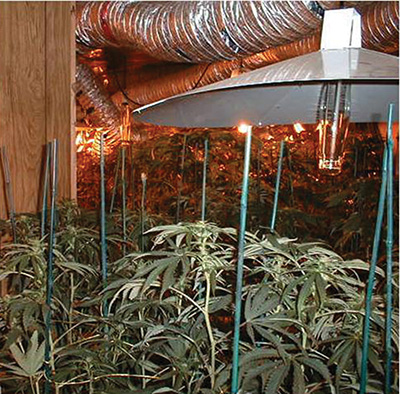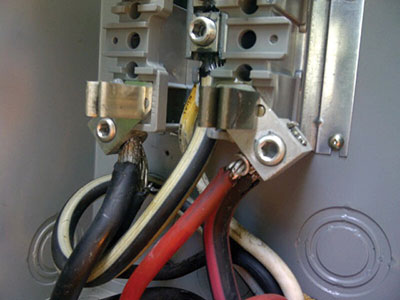
Features
Hot topics
Research
Meter MYTH
Much has been reported across Canada and around the world about the fire safety of smart meters, but how much has been based on evidence?
November 22, 2013
By Len Garis
Much has been reported across Canada and around the world about the fire safety of smart meters, but how much has been based on evidence? A new study by a Canadian university brings a long overdue scientific approach to this issue.
 |
|
| Marijuana grow operations use many grow lamps and draw high amounts of electricity. The excessive flow of electrical current, combined with tampered equipment, creates a fire hazard. Photos courtesy Surrey Fire Services
|
In September, the University of the Fraser Valley released Revisiting the Safety of Smart Meter Installations in British Columbia, which examined several years of provincial fire data in search of a link between smart meters and an increase in residential fires. Ultimately, the study concluded that smart meters are not the major fire risk they have been purported to be in the media.
Widely in use across Canada and internationally, smart meters are part of a comprehensive wireless system that provides utilities with detailed information about the status of the electricity grid, including automatic failure alerts and tamper indicators.
Utility providers across Canada have begun to install smart meters over the past few years. The most advanced programs are in Ontario (with more than 4.5 million smart meters in homes and small businesses) and British Columbia (with an estimated 1.8 million smart meters in homes). By July, 40 per cent of homes in the United States had smart meters (totalling 46 million meters); it is predicted that 250 million smart meters will be in use worldwide by 2015.
Smart meters are said to reduce electricity theft, save energy, improve efficiency and help to quickly identify and address safety issues such as overloaded service and electrical bypasses that are commonly associated with marijuana grow operations. In fact, there is an expectation that smart meters may actually cause a decline in electricity-related fires in general, including those in marijuana grow operations.
However, the mass rollout of millions of new smart meters has also prompted concerns about fire safety, based on media reports across North America about fires following meter installations.
One of the most widely reported Canadian incidents was a June 2012 residential fire in Mission, B.C., that was initially reported to have been started by an electrical fault in a newly installed smart meter (the subsequent investigation eliminated the meter as the cause of the fire).
 |
|
| If a live line from a broken meter base accidentally touches the metal box, for example, it creates a short, which can cause a fire.
|
In Ontario, reports of smart meters causing several fires prompted a review by the Office of the Fire Marshal and Emergency Management (OFMEM). The OFMEM is aware of nine fires between May 2011 and March 2013 in which the ignition source was related to the smart meter installation (not the meter itself), and 10 incidents involving smart meters that failed due to an internal fault. Almost all the incidents occurred shortly after the smart meters were installed. The numbers represent a very small portion of structure fires in Ontario in which the source of ignition was electrical distribution equipment: 680 in 2011 and 614 in 2012.

|
|
| This tampered meter base bypassed the meter by directly tapping into the wires from BC Hydro.
|
“The number of smart meter-related incidents is quite low compared to the 4.5 million smart meters that have been installed in residences and small businesses across Ontario since the start of the program in 2007,” the OFMEM noted. “While not a significant number of events, the OFMEM will continue to monitor fire incidences involving electrical meters.”
It is important to point out that a variety of smart-meter technologies are in use across the country, and therefore broad-brush statements about the safety of meters should be avoided.
UFV study
The intent of Revisiting the Safety of Smart Meter Installations in British Columbia was to test the theory that smart meters are a major fire hazard by reviewing actual fire data in British Columbia before and after the meters were rolled out. The frequency of residential fires from marijuana grow operations was also considered, given that smart-meter technology is said to reduce some of the safety risks associated with grow operations, which require large amounts of energy.
The study analyzed data from 5,747 British Columbia residential structure fires, including 1,988 in 2010 and 2011 (before metering began), and 3,749 in 2012 and 2013 (after metering was implemented). Data was provided by the province’s Office of the Fire Commissioner. It should be noted that meters were not in place in all British Columbia homes during the post-meter period.
What the data showed
Pre-meter and post-meter fire data was compared to determine the frequency of structure fires related to electricity. Residential structure fires made up approximately one-third of all fires reported during the study period, but overall, electricity-related fires make up less than one per cent of overall residential fires in British Columbia (see Table 1).
 |
|
| View larger Table |
Ultimately, the available data suggests there is no cause to be alarmed about the fire safety of smart meters:
- Since July 2010, there has been a 12.3 per cent decline in residential fires with an electrical source, and a 15.3 per cent decline in fires ignited by electrical distribution equipment.
- Electrical distribution equipment – causing the types of fires most closely related with the smart-meter bases – generally caused a very small percentage of the overall residential structure fires in both the pre-meter and the post-meter fires. The number of these fires has fluctuated but similar numbers/percentages were seen both before and after the rollout.
- There were no post-meter cases of fires related to the electrical panel board/switchboard on an exterior wall, although there was one case before the meters were installed.
In terms of fires related to illegal operations (e.g., marijuana growing), the study showed these types of fires actually declined after July 2010 – perhaps an indication that smart meters are having an effect on reducing the safety hazards related to these illegal activities. After July 2010:
- 50 per cent fewer fires were caused by an act or omission associated with illegal operations
- 62.5 per cent fewer fires were caused by electrical bypasses (typically associated with the theft of electricity to grow marijuana), and
- 60 per cent fewer fires were caused by the illegal use of grow lamps.
These fires, too, make up a very small percentage of British Columbia’s residential fires.
Putting data into context
By comparison, cooking and smoking combined make up about half of residential fires in British Columbia. From July 2010 to June 2013, there was a 5.9 per cent decrease in fires caused by smoking materials but an eight per cent increase in fires caused by cooking equipment – over a time period when the total number of residential fires dropped by 9.9 per cent (see Table 2).
 |
|
| View Larger Table |
The study’s data sample included all fires reported for the entire province during the study period, and so represents the best estimates available at this time.
The results strongly suggest that smart meters are not a major fire risk, given that electrical sources cause less than one per cent of residential fires in British Columbia, and that the number of electricity-related fires declined after the smart-meter rollout in the province. Further, the reduction in marijuana grow operation fires – particularly those related to electrical bypasses and high-wattage grow lamps – indicates smart meters may be having a positive effect in that area.
At the same time, the study alerts us that cooking and smoking – which make up half of residential fires – are by far a larger concern in terms of fire risk. Clearly, we need to focus our attention and efforts to reduce the significant number of preventable fires related to cooking and smoking.

|
|
Len Garis is fire chief for the City of Surrey, B.C., past president of the B.C. Fire Chiefs Association, and an adjunct professor in the School of Criminology and Criminal Justice at the University of the Fraser Valley and a member of the Institute of Canadian Urban Research Studies, Simon Fraser University. Contact him at lwgaris@surrey.ca
Print this page